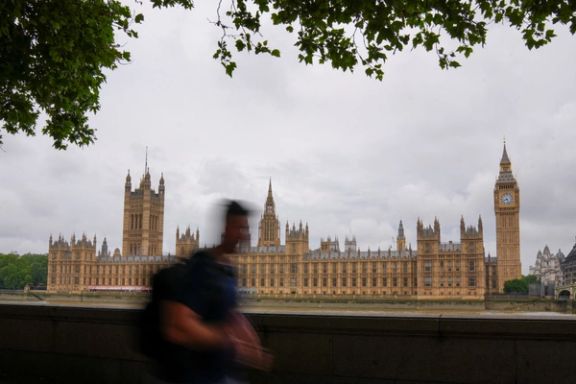The report highlights Tehran’s escalating willingness to carry out assassinations, espionage, and cyber attacks within the United Kingdom, and calls for a fundamental shift in British strategy toward the Islamic Republic.
The 260-page report draws on classified intelligence and interviews with senior officials across MI5, MI6, GCHQ, the Cabinet Office, and the Home Office.
It paints a detailed picture of Iran’s evolving threat posture, concluding that the Tehran "is a pragmatic actor, often driven more by opportunism than ideology," and increasingly capable of projecting that pragmatism into hostile activity on British soil.
“The Iranian regime’s fundamental objective is to ensure the survival and security of the Islamic Republic,” the ISC said. “It has an acute historic sense of vulnerability. This shapes, directly or indirectly, its actions.”
Since January 2022, there have been at least 15 attempts at murder or kidnap against British nationals or UK-based individuals, according to the report.
Tehran's embassy in London issued a statement expressing "its strong protest and categorical rejection of the baseless, politically motivated and hostile claims," denying any acts of violence, espionage or cyber attacks on UK soil.
British intelligence chief Ken McCallum, head of MI5, said last year: “Iranian state actors make extensive use of criminals as proxies—from international drug traffickers to low-level crooks."
These operations, aimed primarily at dissidents and critics of the Islamic Republic, mirror tactics Iran has employed across the globe in continents including Africa, Asia and Europe.
Targeting critics
Iran has significantly stepped up efforts to intimidate dissident media outlets and Tehran opponents based in the UK, the report said. "That sharp increase in the physical threat represents the biggest change over the last 12 to 18 months in the overall Iranian threat to the UK."
"Of greater concern are Iran’s attempts to intimidate Iranian dissidents and employees of media organisations – such as Iran International – in the UK and beyond," the report said. "Some reports suggest these efforts to intimidate the regime’s perceived opponents have had a significant impact on the Iranian diaspora community in the UK."
In another section on increase in physical threats, the report said the increase in the physical threat shows how the domestic situation in Iran can indirectly affect the Iranian threat to the UK.
"In particular, MI5 told the Committee that it has seen persistent targeting of Iranian media organisations operating in the UK, primarily Iran International. BBC Persian and Manoto TV – which are broadcast from the UK – are also prominent targets, as they are viewed by Iran as 'deeply undermining of the Iranian regime.'"
'Greatest level of threat'
“The threat of physical attack on individuals in the UK is now the greatest level of threat we currently face from Iran,” the Homeland Security Group told the Committee. “It is comparable with the threat posed by Russia.”
"Since the beginning of 2022, there has been a significant increase in the physical threat posed by Iran to those residing in the UK. It has significantly increased both in pace and with regard to the number of threats."
MP Kevan Jones, the committee chair, said in a statement: "Iran is there across the full spectrum of all the kinds of threats we have to be concerned with."
UK-based targets and broader goals
According to the report, Tehran seeks to reduce the UK's military footprint in the Middle East, undermine its alliance with the United States and Israel, and suppress criticism of the Islamic Republic—including from exiles and journalists living in the UK.
“Iran and the UK have a complex history,” the report said. “Iran’s leadership perceives the UK to be a significant adversary—a ‘cunning fox’—opposed to the Iranian regime’s values and, as part of the West, seeking regime change.”
The Joint Intelligence Committee (JIC) Chair echoed these concerns, telling the ISC: “There is a deep suspicion [of the UK] for historical reasons as well as relatively contemporary reasons.”
Espionage and cyber operations
Iran’s espionage activity, the report warns, is “significant” and directed mainly through cyber capabilities but also via human agents. While the UK may sit just below the US, Israel, and Saudi Arabia in Tehran’s targeting priorities, intelligence officials warned that this could quickly shift.
“We are a priority target ... for Iran in an espionage sense,” the JIC Chair told the Committee. “Because they regard the United Kingdom as a particularly malevolent opponent of the Islamic Republic and, secondly, because of the role we play in nuclear negotiations and the relationship which we have with the United States.”
Cyber operations are another critical tool in Iran’s asymmetric arsenal, according to the report. It describes Tehran as “an aggressive cyber actor with extensive capabilities,” albeit less sophisticated than Russia or China.
The National Cyber Security Centre (NCSC) warned that many British entities are currently not equipped to detect or defend against Iranian cyber intrusions.
“It is essential to raise the resilience bar,” the ISC wrote. “If there is good cyber security and resilience across the UK, then it is less likely that Iran’s cyber-attacks will be successful.”
Policy gaps
The Committee welcomed some steps taken by the UK Government since receiving the draft report in April 2024, including the designation of Iran under the Enhanced Tier of the Foreign Influence Registration Scheme and new legal powers enabling the proscription of state-backed entities such as Iran’s Islamic Revolutionary Guard Corps (IRGC).
However, the Committee criticized the government for its approach to Iran. “The Government's policy on Iran has suffered from a focus on crisis management and has been primarily driven by concerns over Iran's nuclear program—to the exclusion of other issues,” the report said.
“'Fire-fighting' has prevented the Government from developing a real understanding of Iran, with a lack of Iran-specific expertise across Government.”
One critique in the report centered on the absence of Iran-specific expertise across the British Government. “We were particularly struck by one critique: if you have people running policy in the Foreign Office who don't speak a word of Persian, then that is a fat lot of good, to be honest."
The release of the report comes amid increasing scrutiny of Iran’s influence across Europe. Earlier this week, Italian authorities uncovered a broad network of individuals allegedly working to promote the Islamic Republic’s narrative in Europe.
“Whilst Iran favors proportionality in relation to conflict, this is not always achievable or pragmatic,” the Committee wrote. “It wants to avoid a full-scale war. It has therefore focused on the development of ‘asymmetric’ capabilities and a network of aligned militant and terrorist organizations across the Middle East to spread influence and deter potential aggressors.”
The Committee urged the UK Government and its allies to take a firmer stance in making clear that Iran’s hostile activities within the UK are unacceptable.
“We commend the efforts of MI5 and the police in response to what is now a serious threat, and we encourage the Government and its international partners to make it clear to Iran—at every opportunity—that such attacks would indeed constitute an attack on the UK and would receive the appropriate response.”






